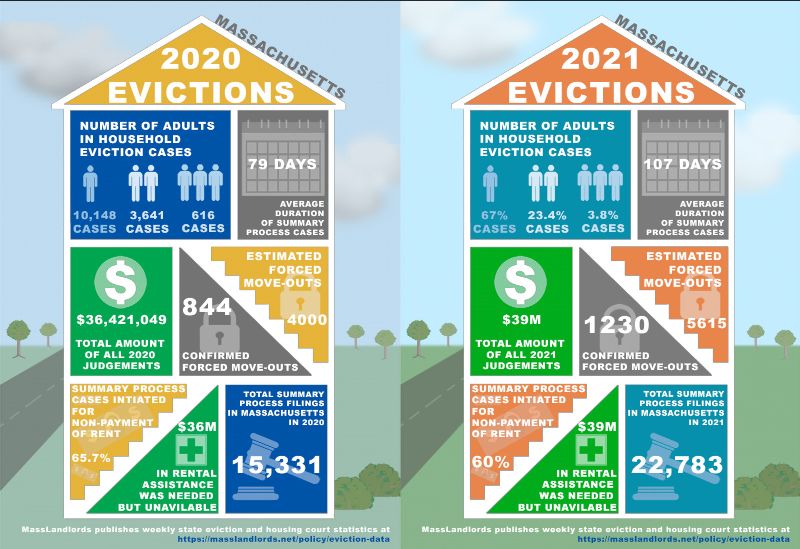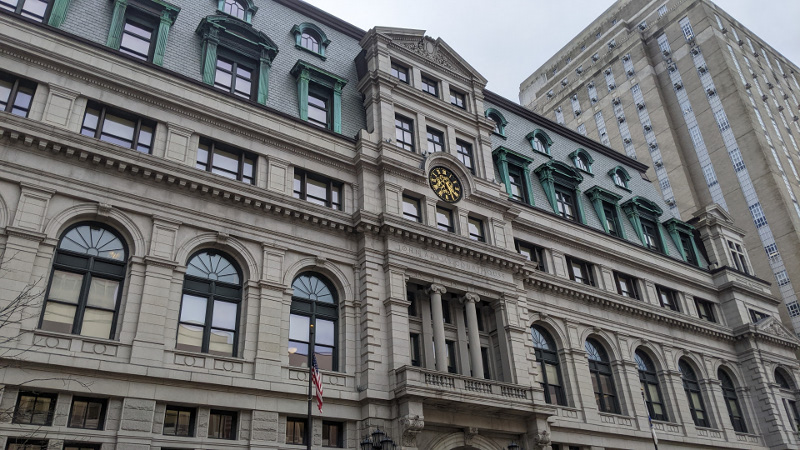MassLandlords Argued Appeal of EOHLC Records Suit, Still No Decision
. Posted in News - 0 Comments
On Thursday October 5, MassLandlords legislative affairs counsel Peter Vickery argued the next step of our case against the Executive Office of Housing and Livable Communities (EOHLC). We have asked to inspect the addresses and statuses (but not names) of hundreds of thousands of applications for pandemic rental assistance. As of Nov. 15, a decision still had not been issued by the court of appeal.

As rental assistance ramped up from 2020 through 2021, the total number of evictions and judgments actually increased at a time when rental assistance covered 18 months of arrears. We need to inspect these applications in detail to see whether anyone slipped through the cracks. CC BY-SA 4.0 Jennifer Rau MassLandlords
By the state's own affidavit, 47,000 of the 151,000 applications for rental assistance received as of January 2022 had been lost to supervision. These were believed printed out on paper and sitting in boxes. Half of all applications had been rejected. Knowing the addresses would allow us to compare applications to evictions to identify systemic failings either at specific regional administering agencies or statewide.
At legal issue is whether the Superior Court should have conducted a balancing test of public interest against privacy interests. EOHLC (then called the Department of Housing and Community Development) asked the lower court to dismiss our case without a balancing test. The Superior Court agreed.
MassLandlords objected. The Superior Court decision, if correct, would allow the state to spend any amount of money in secret so long as the privacy of a residential address is at stake. Since the addresses at issue are not just renter addresses but also housing provider addresses, this is equivalent to the state paying $1 billion to subcontractors to pave roads to secret, unnamed houses. Where is what we paid for? And more to the point, where did we fail to award assistance?

The John Adams Court House in Boston houses the Appeal Court where we argued the case.
Eviction Data Show Need for MassLandlords Appeal
As a result of the state's maladministration, $75 million of judgments entered into the Housing Court for calendar years 2020 and 2021, and between 2,074 and 9,615 households were forcibly removed from their homes. With the exception of the first two and a half months of 2020, basically all of these households ought to have been eligible for RAFT. Landlords were harmed by association. If there are unlawfully discriminatory patterns visible (e.g., in census tract data for race), we should be allowed to see this and to raise the claim.
Those of us who experienced denial know that the denials fell most heavily on people with disabilities, families with children, renters who speak English with limited proficiency, and unfairly on the basis of additional protected class statuses like race. If we are to improve our safety net, we have to make sure it is capable of catching everyone.
The Superior Court decision makes it impossible to inspect the detailed administration of rental assistance records, invalidating the public records law and discrimination law in a single careless stroke of the pen.
We have assiduously argued that the privacy interest is outweighed by the public interest. Most of us received pandemic rental assistance of some form or another, including many otherwise wealthy people (e.g., paycheck protection loans given to business owners.) No one of normal sensibilities was embarrassed by this. Furthermore, the privacy interest someone has in an address from which they were evicted is negligible. It seems the people most likely to be embarrassed are state employees. They partially botched the pandemic response, which is understandable. But then they stymied public inspection, which is unpardonable.
Massachusetts has a history of deliberate and wrongful opacity. The legislature exempts itself from public records law and open meeting laws. The governor exempts herself from the same and refuses to notify the public when she's no longer in charge for having left the state. The Massachusetts Legal Assistance Corporation, which funds legal aid and throughout the pandemic had very poor per-case cost ratios, had told us they are exempt from public records (this is false, but we haven't yet raised the claim). Lobbying violations seem frequent, most notably, in Boston.
At the appeal, a panel of three justices asked a variety of questions, including questions about our evidence for the state's discrimination. Obviously if we are unable to obtain the public records, we cannot have evidence for discrimination. This is why we brought a public records case and not a discrimination case. (We do have prima facie evidence for discrimination where the state asked about children on the application, but this was not entered into the record for this case.)
We have a variety of options to pursue the matter regardless of the appeals court decision. We hope the matter will be remanded back to Superior Court. We will keep you posted.
In many ways, the state's pandemic response was nation-leading. When pandemic rental assistance was available, eviction filings were half of pre-pandemic normal instead of potentially much higher. And forced move-outs were 10% of pre-pandemic normal, instead of potentially much higher. It worked 90% of the way! We wish we lived in a state where the last 10% mattered. That last 10% is us and our renters.
Members who wish to support our policy advocacy should ensure that dues plus property rights contributions are equal to 1% of gross rents.




